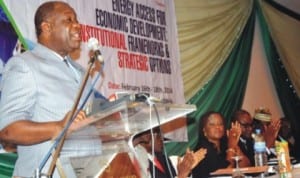Oil & Energy
Fear Grips Power Company Staff …As Contract Ends Next Week
Morbid fear now grips
workers in the generation (GENCOs) and distribution companies (DISCOs) across the country as their six months contract work agreement terminates next week.
The Tide investigations show that the new GENCOs and DISCOs which bought over the defunct Power Holding Company of Nigeria (PHCN) have since begun strict assessment of their staff performances and have penciled down thousands of their staff for disengagement.
Though when contacted, the Acting General Manager Public Affairs of Port Harcourt Electricity Distribution Company (PHEDC), Mr Obi Onuwah, declined comment on the pending loom, but a reliable source confirmed that the company has since last month started performance assessment and authoritatively revealed that over 1,000 staff of PHEDC may be laid off.
Our correspondent who visited some Business Units of the company reports that sack fever has gripped the staff whose hopes now hang in the balance.
“Honestly, the issue is the biggest worry in my unit. Most of us have embarked on fasting and prayer because only God can retain one here”, said a worried employee in the Diobu Business Unit.
The lady staff who pleaded anonymity said nobody is free including the big officers in the unit.
At the Borikiri Business Unit, another male staff said, “that is what the staff are bothered about day and night.”
It was gathered that some staff have started serious lobbying using their influential contacts to see if they could scale through.
At Rumuola Business Unit, a staff told The Tide that, some have already gone spiritual – consulting native doctors, while others consult their church priests for prayers and others who have big people in the government, particularly those who were instrumental in the sale of PHCN to help save their jobs.
While handing over to power investors who bought over the defunct PHCN, on November 1st 2013, the Federal Government ordered the retrenchment of about 20,000 out of over 50,000 PHCN workers.
Those staff who survived the initial retrenchment exercise were re-engaged by the private investors on the condition that their performances would be reviewed after six months which expires this April (next week) to determine if they would continue or go.
To survive the impending sack The Tide investigation showed that the new staff particularly the middle and junior cadre work under all manner of hash condition without any iota of complaint to avoid attracting issues that could endanger their stay.
This was quite unlike before when they were working under the defunct PHCN when the usual laxity associated with government work was the order of the day.
Early this month, our correspondent revealed that a secret cocktail party was organised in Port Harcourt by PHEDC where the Business Unit managers had their performances re-examined.
The party which was organised quietly without involving the press was used to honour some business managers and other senior managers who performed creditably while those who could not meet the required high record were reprimanded.
One unique thing according to our correspondent was that revenue generation was the major concerned of the new investors.
Our source further said that unlike the period of PHCN, there was a remarkable improvement in virtually all business units in terms of revenue generation.
This explains why in the recent past, the issue of crazy bills was the complaints of consumers every where to enable the units meet their high revenue targets.
While remarkable improvement was recorded in revenue generation, by the new investors, some analysts insist that the new investors must listen to the lamentations of power consumers over poor electricity supply.
Mr Johny Nwobodo, a Port Harcourt based businessman said assessment based only on revenue is not enough. “It must include workers’ welfare. It must most importantly take into cognizance the quality and standard of service delivery to the public”.
Another business manager, Nduka Clarice advised the Power investors on the danger of sacking more workers after the six months contract.

Minister of Power, Prof. Chinedu Nebo (left), declaring open the 7th Annual Nigerian Association for Energy Economics and International Association for Energy Economics conference in Abuja, recently.
Chris Oluoh
Oil & Energy
NERC, OYSERC Partner To Strengthen Regulation

Oil & Energy
NLC Faults FG’s 3trn Dept Payment To GenCos

Oil & Energy
PENGASSAN Rejects Presidential EO On Oil, Gas Revenue Remittance ……… Seeks PIA Review

-

 Education5 days ago
Education5 days agoElga boss tasks law students on academics strides
-

 News2 days ago
News2 days agoAmend Constitution To Accommodate State Police, Tinubu Tells Senators
-

 Politics2 days ago
Politics2 days agoSenate Urges Tinubu To Sack CAC Boss
-

 News2 days ago
News2 days agoDisu Takes Over As New IGP …Declares Total War On Corruption, Impunity
-
Business2 days ago
President Tinubu Extends Raw Shea Nuts Export Ban To 2027
-
Business2 days ago
Crisis Response: EU-project Delivers New Vet. Clinic To Katsina Govt.
-
Business2 days ago
President Tinubu Approves Extension Ban On Raw Shea Nut Export
-

 Business2 days ago
Business2 days agoPENGASSAN Rejects Presidential EO On Oil, Gas Revenue Remittance … Seeks PIA Review

